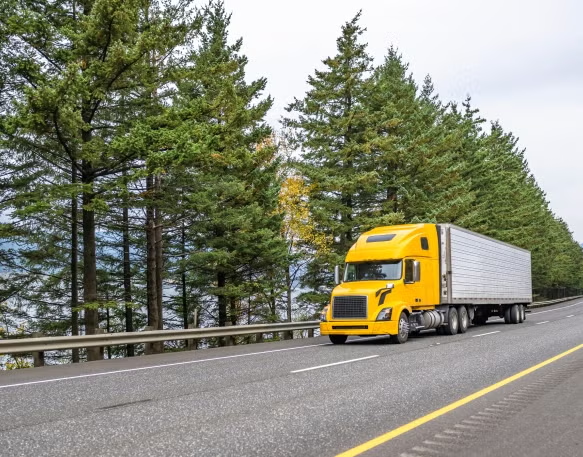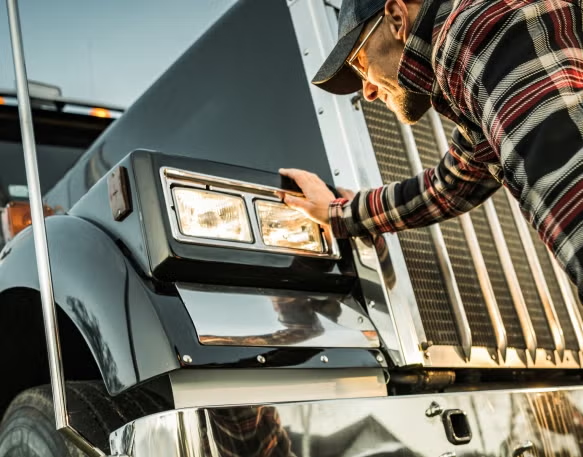With the right type of trucking job, you can make an enjoyable and sustainable income. Plenty of people are interested in working in the trucking industry, transporting goods across the country, and keeping our economy moving. Now more than ever, trucking companies need new and committed drivers.
But, before you get your foot in the trucking industry, it’s important to understand what type of trucking job you are looking for. There are dozens of trucking types to choose from, and each one requires different skill sets. Different types of trucking jobs require specific upfront investments, as well as specialized commercial driver licensing requirements.
Finding the right trucking job for you is a major step toward your success as a carrier. Let’s take a look at some of the types of trucking jobs available — and the pros and cons of each. By the end of this article, you will have a better idea of the most common types of truck drivers on the road.
What types of trucking jobs are there?
Trucking is more than just driving a semi-truck from point A to point B. Trucking is one of the centerpieces of the nation’s economy, bringing large quantities of freight from shippers to distributors and customers.
Most people think of trucking in terms of long-haul trucking, driving semi trucks full of freight across the interstate. But long-haul trucking is just one of many different types of trucking jobs available. In fact, many carriers start off in smaller vehicles with fewer upfront costs before moving onto full-size trucks.
Let’s take a look at six of the most common types of trucking jobs and what makes them tick.
1. Long-haul trucking (a.k.a. “OTR trucking”)
Long-haul trucking is probably what most people think of when we talk about working as a trucker. Also known as over-the-road (OTR) trucking, long-haul truckers carry freight from shippers to consignees. Long-haul truckers require the longest journeys away from home base, with lots of interstate travel.
Long-haul trips last more than a day and often last up to a week. Because long-haul truckers are constantly transporting loads across the continent, this job is best suited for people who are comfortable with long-term trips on the road. Some might see this as a con of OTR trucking — but plenty of long-haul truckers enjoy the travel. For people interested in the long-haul lifestyle, long-haul trucking can be an excellent way to make more money than carriers who operate across short distances.
A Class A CDL license is the licensing requirement for OTR truckers.
2. Dry van trucking
Dry van trucking refers to the type of trailer you’re using — not the trip’s distance. Dry van trucking makes use of a traditional semi truck with a 53-foot trailer, which is filled with cargo from your shipper. Many dry van trucking jobs are long-haul, meaning you will spend multiple days on the road and potentially even switch drivers. Bear in mind that dry van trucking also requires Class A CDL licensing (which we will talk about later in more detail).
Dry van trucking generally uses loose, dry freight that’s not refrigerated — lots of household items are transported in dry van trucks, including non-perishable foods, household items, and anything else that isn’t temperature sensitive and can be transported on pallets. In terms of labor requirements, dry van truckers are almost always not responsible for loading the goods on and off the truck — that is the job of the shipper and the consignee.
If you’re looking to become a long-haul trucker, there are lots of trucking companies that hire long-haul truckers on a contract basis. It is also possible to become an owner-operator for long-haul vehicles, but this often requires more upfront investment than smaller, local trucking companies.
Because dry van truckers are in high demand, lots of truck drivers start off as dry van drivers before they move on to other, more specialized freight.
3. Flatbed trucking
Flatbed truck drivers transport specialty freight, usually across long-haul distances. Because flatbeds often carry oversized freight that can be difficult to load on and off, there is a high demand for flatbed carriers in the transportation industry. As a result, flatbed truckers can make more than traditional dry van truckers for long trips (though those earnings can be offset by the higher expenses that flatbed truckers typically face due to their vehicles being significantly less fuel efficient).
There are certainly some cons to flatbed trucking — it’s a difficult job that requires you to transport difficult materials. Flatbed materials, for one reason or another, cannot fit inside a 53-foot trailer. Because of their unusual size and/or shape, flatbed loads need to be secured by an expert in order to avoid major accidents. Flatbed drivers may also end up paying more for cargo insurance, depending on the value of the loads you will be transporting.
Flatbed truckers aren’t always long-haul, though. If you’re interested in a challenging trucking job with regional or local routes, a flatbed could be a good option for you. There are also plenty of long-haul flatbed routes, which require overnight stays.
4. Tanker trucking
Tanker truckers can make a lot of money compared to traditional dry bed truckers. But the dangers of sensitive tanker freight — and the difficulty of transporting tanker goods — is the reason for this increase in pay. Tanker truckers are in high demand since tanker trucks carry gasoline to gas stations, and chemicals to factories.
Tankers often transport hazardous liquids and gasses, which requires a more experienced truck driver. Although not all tanker truckers contain hazmat materials, it is common for tanker truckers to be more experienced due to the difficulty of transporting and loading on and off large amounts of liquid, gas, or dry bulk.
If you’re just starting off in the trucking industry, you may wish to consider a type of vehicle with less challenging load requirements, like a dry van. To become a tanker driver, you will need a CDL A license.
5. Reefer trucking
Refrigerated trucks — also known as “reefer” trucks — provide an important service for food industries across the country. A wide variety of different reefer jobs exist, from local food transportation to large refrigerated trucks for wholesale companies.
Even though there are lots of different types of reefer trucks, they all have one thing in common — a controlled, low-temperature environment. With a refrigerated load, you will need to continuously monitor the temperature of your trailer. You will also need to understand how to quickly identify and address temperature issues, to prevent major damage to your loads. Additionally, all reefer trucks can also haul dry van freight in a pinch!
Depending on the size and scope of your reefer truck, you may need either a CDL B or CDL A license. Long-haul reefer trailers will require a CDL A license.
6. Car hauling
Car haulers are an important part of the transportation industry, bringing multiple vehicles across long distances. Whether you’re transporting new vehicles from a port to a dealer, or old vehicles to a dealership, car hauling often requires long-distance transportation. It is also possible to perform regional and local car hauling, which gives car haulers a degree of flexibility in the length of their routes.
A major advantage of car hauling is the potential for high-paying loads. With luxury car transportation, car haulers can make more than most other experienced truck drivers. The caveat is that luxury car hauling is a high-risk profession — this means insurance is often expensive, and you will need a pristine driving record to transport luxury vehicles.
Car hauling is a high-skill job that requires CDL A licensing — even for regional and local car haulers.
What are the requirements for different types of truck drivers?
By now, you’ve heard a lot about licensing with the CDL program. But what is CDL, and how easy is it to get CDL certification?
A commercial driver’s license (CDL) is a type of license that allows you to make money from transporting freight. Whenever you bring loads from point A to point B in a car or truck, you will need to CDL to legally operate. If you already have a regular driver’s license, you can begin the CDL process with a CDL learner’s permit. This requires a medical background check to ensure your safety on the road, as well as a CDL road test.
The three types of CDL licenses available for commercial drivers are:
- CDL A: This is the typical CDL that many people refer to as simply the “Commercial Driver’s License”. The CDL A is required for any vehicle weighing more than 26,000 pounds, and/or a towed load that weighs more than 10,000 pounds. This means that dry van truckers, car towers, and other large long-haul vehicles require CDL A licensing.
- CDL B: CDL B can be used for smaller vehicles, including reefer vans, city buses, and dump trucks. CDL B truckers usually do not transport freight across state lines, which means young truckers (over the age of 18) can find local and regional jobs with CDL B licenses.
- CDL C: CDL C is a fairly uncommon type of CDL, usually reserved for limo drivers or small mass transit vehicles. CDL C drivers don’t transport freight.
How to decide which type of trucking job is right for you
With all the different types of truck drivers, it can be hard to figure out which type of trucking is right for you. Before you decide which type of truck you’re going to drive, there are plenty of factors you’ll need to consider: how much upfront investment will be necessary? How much will insurance cost? And how much time will I spend on the road away from home?
At DAT, we’re here to help you at each step of your journey to becoming a trucker. The DAT load board offers more loads than any other load board in the industry so that you can get the best selection of freight. No matter what kind of truck you drive, DAT Authority is here to help you get your business up and running, with an easy step-by-step process to getting your operating authority.
Find top trucking jobs with DAT!
No matter what kind of vehicle you drive or what kind of trucking jobs you’re interested in, the DAT load board is the best place to find great freight that fits your specific needs. As the largest freight marketplace in the industry, DAT has everything you need to get on the road. Sign up for DAT today!




